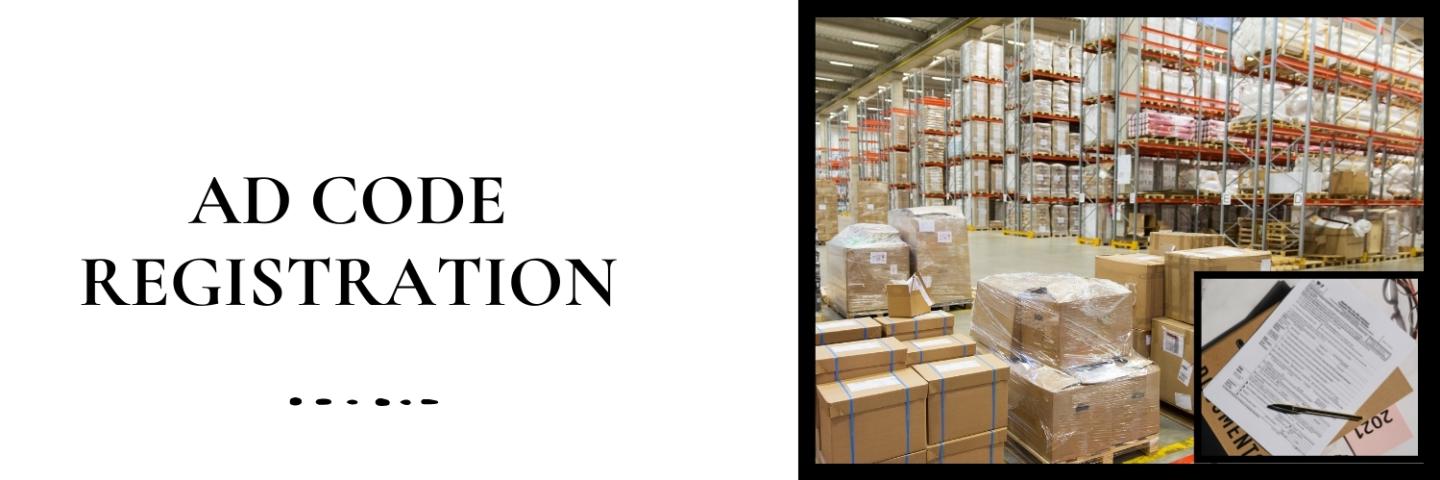When it comes to engaging in import or export activities in India, compliance with regulations is a top priority. One of the essential steps for businesses involved in international trade is obtaining an Authorized Dealer AD Code registration. This unique 14-digit code is issued by a bank and serves as a key identifier for businesses to facilitate import-export transactions through customs.
In this article, we'll provide a beginner’s guide to AD
code registration, explain its importance for businesses like private
limited companies, Section 8 companies, subsidiary companies,
and one-person companies (OPC registration), and delve into the process
of AD code registration on ICEGATE. By the end, you'll have a clear
reason why AD code registration is vital for streamlining global trade
operations.
What is AD Code Registration?
AD Code, or Authorized Dealer Code, is a 14-digit
numeric code issued by a bank that is authorized by the Reserve Bank of India
(RBI) to deal in foreign exchange. This code is required to enable businesses
to clear customs for their import or export shipments. Without AD code
registration, your business cannot legally engage in international trade
activities.
The AD code is crucial for linking your business
transactions with customs, facilitating the seamless movement of goods across
borders, and ensuring compliance with FEMA (Foreign Exchange Management Act)
regulations.
Importance of AD Code Registration
AD code registration is more than just a compliance
formality; it plays a vital role in your business’s import-export operations.
Here’s why:
1. Mandatory for Import-Export Operations
You cannot clear customs for your shipments without an AD
code. Whether you are exporting products or importing raw materials, customs
authorities require the AD code to verify your transactions.
2. Facilitates Smooth Customs Clearance
Once your AD code is registered with customs through
ICEGATE (Indian Customs Electronic Gateway), the customs department can track
and process your shipments efficiently. This reduces delays and ensures smooth
trade operations.
3. Bank Transactions to Customs Links
The AD code helps link your bank with customs authorities,
allowing proper monitoring of foreign exchange transactions. This is crucial
for businesses adhering to the regulations under the FEMA Act.
4. Supports Incentives and Benefits
AD code registration ensures that your business is eligible
to claim various government benefits and incentives for exporters, such as duty
drawbacks and GST refunds.
5. Builds Credibility
Having an AD code registered with customs adds to your
business's credibility. It demonstrates compliance with trade regulations,
which can be beneficial when dealing with international clients or partners.
Who Needs AD Code Registration?
AD code registration is mandatory for any business or
individual involved in importing or exporting goods. This includes entities
like:
-Private Limited Companies:
Businesses registered as private limited companies require an AD code for
customs clearance of shipments.
-Subsidiary Companies:
Subsidiaries of foreign companies engaged in international trade also need AD
code registration.
-Section 8 Companies: Even
non-profits involved in international trade for charitable purposes must obtain
an AD code.
-One-Person Companies (OPC Registration): Solo
entrepreneurs operating as OPCs also require AD code registration for trade
activities.
Step-by-Step Process for AD Code Registration
Here’s a detailed guide on how to obtain AD code
registration for your business:
Step 1: Open a Current Account with an
Authorized Bank
-Open a current account with a bank authorized by the RBI
to deal in foreign exchange.
-Ensure the account is in the name of the entity
undertaking the import or export activity.
Step 2: Gather the Required Documents
Prepare the following documents:
-A copy of your company registration certificate (for private
limited companies, OPC registration, or subsidiary companies).
-PAN card of the business.
-Importer Exporter Code (IEC) issued by the Director
General of Foreign Trade (DGFT).
-GST registration certificate.
-Address proof of the registered office (utility bill, rent
agreement, etc.).
-A canceled cheque from your current account.
Step 3: Submit Application to Your Bank
-Submit an application for AD code issuance to your bank,
along with the required documents.
-The bank will verify your details and issue the AD code.
Step 4: Register the AD Code with Customs
-Once the AD code is issued, it needs to be registered with
customs authorities. This process is typically done through ICEGATE (Indian
Customs Electronic Gateway).
How to Register AD Code on ICEGATE
ICEGATE is the central portal for electronic customs
processing in India. Registering your AD code on ICEGATE is essential for
customs clearance. Here’s how you can do it:
Step 1: Register on ICEGATE
-Visit the official ICEGATE portal.
-Create an account by providing your Importer Exporter Code
(IEC), GSTIN, and basic business details.
-Complete the OTP verification process to activate your
ICEGATE account.
Step 2: Log in and Navigate to the AD Code
Registration Section
-Log in to your ICEGATE account using your credentials.
-To the “Manage AD Code” section on the dashboard.
Step 3: Enter Your AD Code Details
-Select the customs location where your shipments will be
cleared (e.g., the port or airport).
-Enter the 14-digit AD code issued by your bank.
-Upload a scanned copy of your AD code letter provided by
your bank.
Step 4: Submit the Request
-Submit the registration request.
-The customs authorities will review your application and
once approved, your AD code will be linked to the selected customs location.
Step 5: Verify the Registration
-After approval, you can verify the AD code registration
status on ICEGATE.
-Ensure the code is linked to all customs locations where
you plan to clear shipments.
AD Code Registration for Different Business
Types
1. Private Limited Companies
For private limited company registration, obtaining
an AD code is a critical step for engaging in international trade. The process
involves ensuring compliance with banking and customs regulations to facilitate
smooth operations.
2. Subsidiary Companies
A subsidiary company of a foreign parent often
engages in cross-border trade. AD code registration ensures that the subsidiary
can comply with FEMA and customs regulations while benefiting from government
trade incentives.
3. Section 8 Companies
Even though Section 8 companies are non-profits,
they may require AD code registration if they import goods like medical
equipment or export goods for charitable purposes.
4. One-Person Companies (OPC Registration)
For individuals operating as OPCs, AD code
registration simplifies the customs clearance process, even for smaller-scale
trade activities.
Common Challenges and Solutions in AD Code
Registration
1. Document Errors
Errors in the documentation can delay the process. To avoid
this, double-check all documents, including the IEC and GST registration
details.
2. ICEGATE Portal Issues
Businesses sometimes face difficulties navigating the
ICEGATE portal. In such cases, seeking assistance from a customs broker or
consultant can simplify the process.
3. Port-Specific Registration
AD codes need to be registered separately for each customs
location where shipments will be cleared. Plan and ensure registrations are
completed for all relevant ports.
Benefits of AD Code Registration
1. Access to Government Incentives
Exporters with AD code registration can claim benefits like
duty drawbacks, MEIS (Merchandise Exports from India Scheme), and GST refunds.
2. Streamlined Operations
Linking your AD code with customs ensures that your
import-export operations are seamless, with minimal delays.
3. Legal Compliance
AD code registration ensures compliance with FEMA and
customs laws, protecting your business from penalties.
4. Improved Business Credibility
Having an AD code establishes your business as a legitimate
player in international trade, boosting credibility among partners and clients.
Real-World Examples of AD Code Registration
Example 1: A Private Limited Company Exporting
Goods
A startup registered as a private limited company
exports textiles to international clients. After obtaining the AD code and
registering it on ICEGATE, the company can smoothly clear its shipments at the
Mumbai Port and claim export incentives under the GST regime.
Example 2: A Subsidiary Company Importing
Equipment
A foreign subsidiary company operating in India
imports machinery for local manufacturing. By obtaining and registering its AD
code, the company complies with FEMA and avoids shipment delays.
Conclusion
AD Code registration is a critical requirement for
businesses involved in international trade. Whether you're running a private
limited company, a Section 8 company, an OPC, or a subsidiary
company, obtaining and registering your AD code ensures smooth customs
clearance, compliance with legal requirements, and access to export benefits.
By the process of AD code registration on ICEGATE, businesses can streamline their trade operations and minimize potential delays. If you're planning to engage in import or export activities, start your AD code registration process today and set the foundation for hassle-free global trade.













